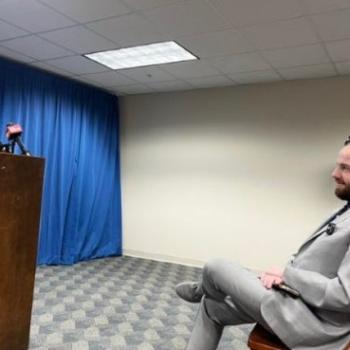When it comes to actually preparing, I would take 2-3 weeks in the summer where I didn't take appointments and I would break everything down into sections of texts, giving titles to texts and writing about two paragraphs summarizing what I think the core of that text is in relation to the series that we're on. Now sometimes I came to it just as the book itself, for instance, "We're doing Matthew." Sometimes I came to it through a specific lens, such as "Matthew as the Gospel of Surprise." My way of juggling the topical versus biblical debate is I'm looking at it in both ways. Fundamentally, I want it to be driven by the text, even though it's presented as a topic. Sometimes, I begin by asking certain questions of the text. And other times, my study led me to an overarching theme.
So after those two weeks, I had the following year's sermons broken down into outlines, paragraphs, and themes. I also prepared a summary document that talks about the purpose of the series and what points I think the text is trying to make and why we are doing this in this season of the church's life. So that becomes the fuel for music, worship, Bible study, writing, or whatever else. So long before I ever get to a sermon, all of this has happened. So I never get to Tuesday and am panicking about Sunday. I'm not saying that in a cavalier way, but it's just been steeping for that long. In the end, I'm just walking people through the text.
Now, preaching is more varied and creative than that, so all during this seasoning period and on the Tuesday beforehand, I do more exegetical work and step back and try to think imaginatively and randomly about where all this ties into the theme or recent events—lateral, big thinking. Then it begins to have a definitive shape. I tend to think of every sermon as having an internal storyline about what this story is doing. I'm inviting people into this text and we are going to tell this story together.
Where are the sticking points? What's the main point? What are the qualifiers and tensions? Sift, sift, sift, sift. Discern. Pray. Discern. Pray. Until finally it begins to feel that this is what the sermon is about in one or two statements and what do I most want people to remember about this text in their lives, in the world? Am I calling them to action? I try to get out of the way of the text and let it drive what's happening. So, I am not driving for application but to bring the text home. Application often means something very tangible and specific, but that is seldom the way the Bible works. It seems reductionist. I am looking for character and life and transformation, but making clear that the evidence for that internal work will be external work. My bigger purpose is that people get a larger sense for the heart of God.
What is the future of preaching?
There is a lot of experimentation going on but a lot of it is a chasing technique. If people tweet on the screen behind me or my sermon is more conversational, then that is the latest thing. Any of that, all of that, none of that is fine. We live in a visually demanding and pragmatic age. We want things to happen and we want to respond immediately. The tangibility of new forms is good because people want to be in conversation.
But I think the crisis is not about form, but content. Do we actually believe God's Word is exceptional to our own? I think that is the bigger question that must be wrestled with. Do we believe God has a truer and more authoritative voice? And some of the new techniques are about legitimate genuine incarnationalism and some of it is about saying I don't want to hear someone else's voice as much as I want to hear my own. There is a scandal about preaching that is unfortunately wedded to the patriarchal idea of a person in a robe in a pulpit and talking down to "You people," but at its truest, that line of authority is about God's authority that is meant to redefine everything else. And our crisis in the church is not being able to acknowledge and submit to God's authority. That conversation supersedes the debates about techniques and questions about technology and tweeting.
Preaching has gone in and out of fashion over the centuries, but the things that keeps bringing it around is how do you make an assertion of a revelatory word over and against all other words, as Barth saw it. So preaching is an attempt to reflect a belief in a monotheistic God come in flesh in one person. How do you communicate that? A faint parallel is one person standing in front of community and declaring that word. There is something about acknowledging the incarnational reality of Christ that requires it. It's not just about the collective community, there is always more than that, there is another and different word to which our community bears witness.





